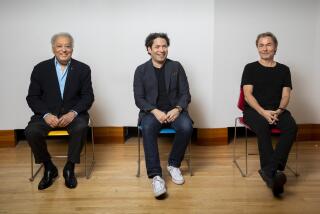MUSIC REVIEW : Duo-Pianists Show They Know Scores at Irvine Concert
- Share via
IRVINE — A large chunk of the repertory for two pianos glorifies showmanship over substance. Duo-pianists Ralph Markham and Kenneth Broadway kept the fluff to a minimum in their concert at Irvine Barclay Theatre on Saturday night.
Interpretatively, the two most demanding works on the program, which was sponsored by the Orange County Philharmonic Society, were Rachmaninoff’s Suite No. 2, Opus 17, and Debussy’s “Prelude a L’Apres-midi d’un faune.” Both received clean, balanced readings, immaculately coordinated with finely drawn details.
The suite in particular requires technical prowess--something Markham and Broadway possess in formidable quantity. The musicians tossed off the difficult waltz with disarming buoyancy, taking their time for the lyric interlude. They created a controlled, whirling frenzy for the closing Tarantella.
Debussy’s “Prelude” emerged thoughtful and subdued, but suffered from inevitable comparison to the better known version. Even the most varied of pianistic palettes cannot match the filmy tentativeness and mystery of Debussy’s orchestration.
Liszt’s “Grand Valse di Bravura” and Hungarian Rhapsody No. 6--for one piano, four hands--followed the “Prelude.” Playing without scores, as they had throughout the recital, the duo imparted bigger-than-life boldness without excess. They continued one another’s lines with remarkable unity and remained attentive to nuance and direction even through the treacherous octaves. They avoided temptation to over-pedal.
A classy montage by Percy Grainger--his Fantasy on George Gershwin’s “Porgy and Bess”--underscored the pianists’ stylistic versatility. Pointed accentuation propelled jazzy rhythms in a polished close.
The biggest nod to the kitschier side of Romanticism came in the form of the Mozart/Grieg Fantasy in C minor, K. 475. Grieg’s added second-piano part totally obscures Mozart’s classical purity. Markham and Broadway lent colors and took tempo liberties appropriate to the later period.
Encores were Rachmaninoff’s song “It’s Lovely Here” and “Le Bal” from Bizet’s “Jeux d’Enfants.”
More to Read
The biggest entertainment stories
Get our big stories about Hollywood, film, television, music, arts, culture and more right in your inbox as soon as they publish.
You may occasionally receive promotional content from the Los Angeles Times.










